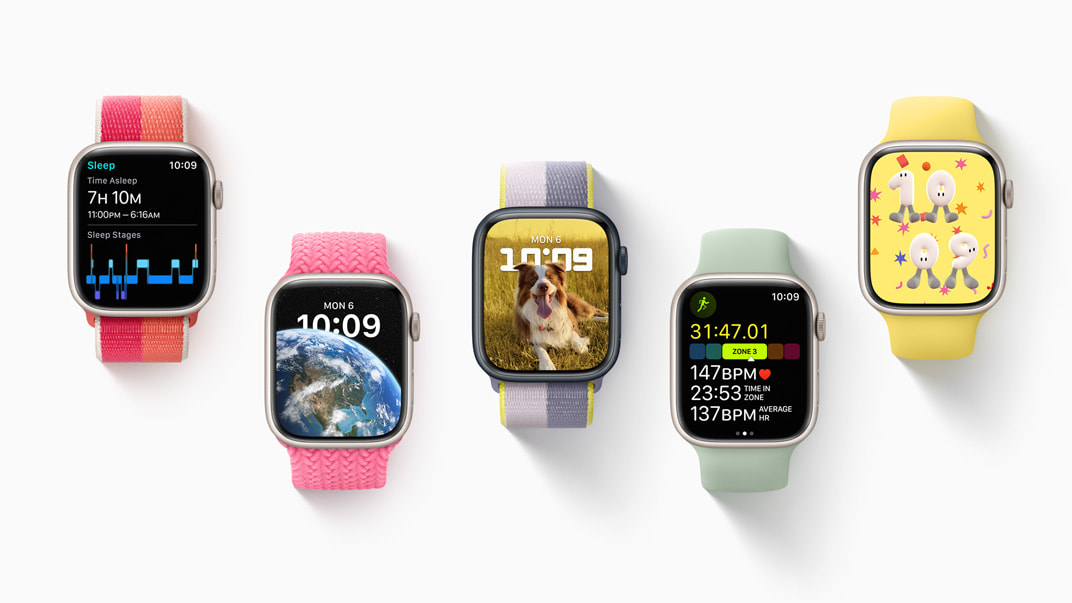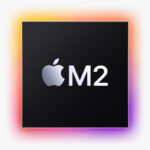CUPERTINO, CALIFORNIA Apple today previewed watchOS 9, which brings new features and enhanced experiences to the world’s leading wearable operating system. Apple Watch users will now have more watch faces to choose from, with richer complications that provide more information and opportunity for personalisation. In the updated Workout app, advanced metrics, views, and training experiences inspired by high-performing athletes help users take their workouts to the next level. watchOS 9 brings sleep stages to the Sleep app, and a new FDA-cleared AFib History feature provides deeper insights into a user’s condition. The new Medications app makes it easy for users to conveniently and discreetly manage, understand, and track medications.
“Users around the world love Apple Watch for helping them stay connected to those they love, be more active throughout the day, and better manage their health,” said Jeff Williams, Apple’s chief operating officer. “This fall, watchOS 9 takes the Apple Watch experience to the next level with scientifically validated insights across fitness, sleep, and heart health, while providing users more creative ways to make their Apple Watch their own.”
Watch Faces for Everyone
The Apple Watch experience starts with watch faces, which give users the opportunity to express personal style while connecting them to relevant information at a glance through complications. watchOS 9 introduces four new faces: Lunar, which depicts the relationship between the Gregorian calendar and lunar calendar, used in many cultures such as Chinese, Islamic, and Hebrew; Playtime, a dynamic piece of art that’s unique to Apple Watch and created in collaboration with artist Joi Fulton; Metropolitan, a classic, type-driven watch face where the style changes as the Digital Crown is rotated; and Astronomy, an original face that has been completely remastered and features a new star map and current cloud data.
watchOS 9 introduces enhanced and modernised complications on some of the most classic watch faces, such as Utility, Simple, and Activity Analog, along with background colour editing for Modular, Modular Compact, and X-Large for additional personalisation. The new Portraits face showcases the depth effect on more photos, including cats, dogs, and landscapes, while Chinese scripts have been added as options for California and Typograph watch faces. Focus now allows users to select an Apple Watch face to automatically appear when they start a specific Focus on iPhone, such as the Photos face during a Personal Focus, helping users stay in the moment.

Workout App Updates
The Workout app, one of the most popular apps on Apple Watch, has been updated to provide richer metrics for measuring performance, as well as new training experiences to help users reach fitness goals. The familiar in-session display now uses the Digital Crown to rotate between easy-to-read Workout Views, so users can see important metrics for different training styles. Heart Rate Zones, which can be manually created or automatically calculated using personalised Health data, can be used to monitor the intensity of a workout. Interval training is an important part of any training plan, and in watchOS 9, the Workout app introduces Custom Workouts, which can be used to create a structured workout that can include work and rest intervals. New alerts, including pace, power, heart rate, and cadence, can be added to guide users throughout the workout.

For triathletes, the Workout app now supports a new Multisport workout type that automatically switches between any sequence of swimming, biking, and running workouts, using motion sensors to recognise movement patterns. When each workout is complete, a redesigned summary page in the Fitness app offers additional details with interactive charts for more precise analysis.

Hit the Ground Running
Apple Watch is already a powerful tool for runners, and watchOS 9 brings more data and features to help track how efficiently users run. New running form metrics, including Stride Length, Ground Contact Time, and Vertical Oscillation, can all be added as metrics on Workout Views. These metrics appear in the Fitness app summary and in the Health app, where users can see trends over time and learn from patterns.

Users can choose to race against their best or last result on frequently used routes, and receive alerts during the workout for being ahead or behind their pace, as well as when going off route. Additionally, a new pacer experience lets users choose a distance and goal for the time in which they want to complete a run, and calculates the pace required to achieve the goal. During the workout, they can follow the pace alerts and metrics provided.

Swimming Enhancements
Kickboard detection has been added as a new stroke type for Pool Swim workouts, using sensor fusion on Apple Watch to automatically detect when users are swimming with a kickboard and classify the stroke type in the workout summary along with distance swam. Swimmers can now track their efficiency with a SWOLF score — a stroke count combined with the time, in seconds, it takes to swim one length of the pool. Users can view their SWOLF average for each set in the workout summary.
Sleep Insights
The Sleep experience on Apple Watch already empowers users to create Wind Down and Bedtime schedules, as well as track their sleep to help them meet their goals. Sleep tracking in watchOS 9 provides even more insights with the introduction of sleep stages. Using signals from the accelerometer and heart rate sensor, Apple Watch can detect when users are in REM, Core, or Deep sleep. Users will see sleep stage data on Apple Watch in the Sleep app and can view more detailed information, like time asleep, alongside additional metrics, like heart rate and respiratory rate, in sleep comparison charts in the Health app on iPhone.
The machine learning models were trained and validated against the clinical gold standard, polysomnography, with one of the largest and most diverse populations ever studied for a wearable. As the science of sleep is still being explored, users will be able to aid in potential discoveries by contributing their sleep stage data in the Apple Heart and Movement Study through the Research app.

First-of-Its-Kind AFib History
Currently, the ECG app and irregular rhythm notification on Apple Watch can identify potential signs of atrial fibrillation (AFib). Left untreated, AFib is one of the leading conditions that can result in stroke.
Research suggests that the amount of time spent in AFib may impact a person’s symptoms, overall quality of life, and risk of complications. Previously, there has not been an easy way to track the frequency of AFib over an extended period of time, or to manage lifestyle factors that may influence one’s condition. According to the American Heart Association, addressing modifiable lifestyle factors may decrease the amount of time spent in AFib.1
With watchOS 9, users who are diagnosed with AFib can turn on the FDA-cleared AFib History feature2 and access important information, including an estimate of how frequently a user’s heart rhythm shows signs of AFib, providing deeper insights into their condition. Users will also receive weekly notifications to understand frequency and view a detailed history in the Health app, including lifestyle factors that may influence AFib, like sleep, alcohol consumption, and exercise.
Users can download a PDF with a detailed history of their AFib and lifestyle factors, which can easily be shared with doctors and care providers for more informed conversations.

Medications
The new Medications experience on Apple Watch and iPhone helps users manage and track their medications, vitamins, and supplements, allowing them to create a medications list, set up schedules and reminders, and view information on their medications in the Health app. The Medications app on Apple Watch makes it easy for users to conveniently and discreetly track medications anytime, anywhere.

Custom schedules can be created for each medication, whether it needs to be taken multiple times a day, once a week, or as needed, and users can set up reminders to help keep them on track. In the US, users can receive an alert if there are potential critical interactions with medications they have added to the Health app.3

Privacy
Privacy is fundamental in the design and development across all of Apple’s features. When a user’s iPhone is locked with a passcode, Touch ID, or Face ID, all of their health and fitness data in the Health app — other than Medical ID — is encrypted. Any Health data backed up to iCloud is encrypted both in transit and on Apple servers.
Additional watchOS 9 Updates
-
- Staying informed in the moment is a powerful part of the Apple Watch experience, and in watchOS 9, notifications have been redesigned to be less interruptive while still being impactful, arriving with new slimline banners when Apple Watch is being actively used.
-
- Family Setup now supports the Home app so a child can be invited as a member to control HomePod speakers and smart home accessories.4 They can also use home keys and hotel keys in Apple Wallet.
-
- With new Quick Actions on Apple Watch, users can do even more with a double-pinch gesture, including answer or end a phone call, take a photo, play or pause media in the Now Playing app, and start, pause, or resume a workout. This builds on the innovative technology used in AssistiveTouch on Apple Watch, which gives users with upper body limb differences the option to control Apple Watch with gestures like a pinch or a clench without having to tap the display.
-
- Apple Watch becomes more accessible than ever for people with physical and motor disabilities with Apple Watch Mirroring, which helps users control Apple Watch remotely from their paired iPhone. With Apple Watch Mirroring, users can drive Apple Watch using iPhone’s assistive features like Voice Control and Switch Control — so they can navigate Apple Watch by using their voice, sound actions, head tracking, and external Made for iPhone switches as alternatives to tapping the Apple Watch display.5 Apple Watch Mirroring uses hardware and software integration, along with advances built on AirPlay, to ensure users who rely on these mobility features can benefit from unique Apple Watch apps like Blood Oxygen, Heart Rate, Mindfulness, and more.
-
- The QWERTY keyboard on Apple Watch Series 7 adds support for French, German, Italian, Japanese, Portuguese (Brazil), and Spanish (Mexico, Spain, Latin America).
-
- Apps that are actively in use are now promoted over the rest of the apps in the redesigned Dock, making it easier for users to quickly return to them.
-
- The Reminders app now lets users add or edit key details such as date and time, location, tags, and notes.
-
- Stay productive with the updated Calendar app by creating new events directly from Apple Watch. For the first time, users can access a Week view in addition to updated List, Day, and Month views to support more scrolling through calendar events.
-
- Cardio Recovery is a useful fitness metric that can be an indicator of cardiovascular health. Apple Watch now provides estimates of Cardio Recovery after an Outdoor Walk, Run, or Hiking workout, even when the workout does not reach peak intensity. This metric can be tracked over time in the Health app.
- New APIs allow developers to build best-in-class third-party apps, with CallKit and share sheet support, access to Photos picker, and the ability to integrate watchOS apps with Apple TV.













